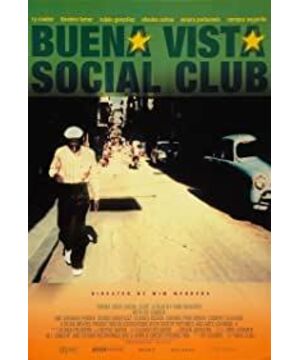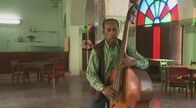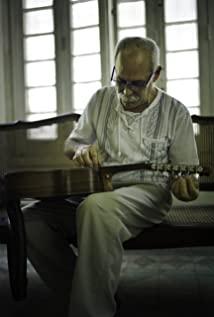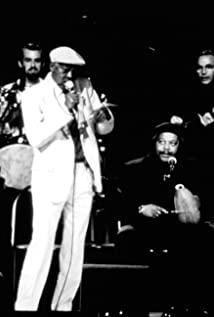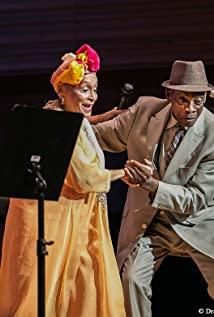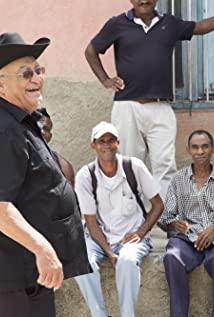The film begins with American guitar master, musician Le Cood and drummer son Joachim Coud riding a motorcycle through the old town of Havana, the capital of Cuba, in 1998. There are long queues in front of state-run bakeries, rambling residents playing cards on the side of the road, and old buildings lined with neoclassical to baroque architectural art styles that have faded from bright colors. Havana, one of the most prosperous cities in Latin America in the early and mid-20th century, known as the "Pearl of the Caribbean Sea" is no longer prosperous. Only those old American classic cars are still telling the past and present of Havana.
However, at this moment, Lai Kuder was not affected by the beauty of the twilight street scene, but felt like a spring breeze. Because he has been doing a big thing for a year since 1997, a big thing to awaken the soul of Havana and Cuba is finally complete - to find the "Buena Vista Social Club" (Buena Vista Social Club) musicians, rebuild the band.
Since the Castro Revolution and the economic blockade imposed by the United States, the development of Cuba has suffered heavy losses. The decline of the Cuban economy and the abolition of tourism have made the "Good View Social Club" and the prosperous CABARET (restaurant with music, singing and dancing) no longer. It has survived, but it is still the best memory of the Batista dictatorship era in the hearts of Cubans, and the most brilliant myth of Cuban music (African-Cuban).
"Roshi Ukiyo-e" is a film directed by Wim Wenders, about a group of forgotten but still loving Cuban music national treasure musicians reorganized "Good View Social Club", rehearsing, recording Cuban classics, going to Documentary of the opening concert at Carnegie Hall in New York, USA.
The film interviews Cuban music masters, including: guitarist Compay Segundo, talented pianist Ruben Gonzales, guitarist Iariadabis Tamandi (Eliades), cellist Orlando Lupez, percussionist Amadeus Verdes, trumpet player Manio Vasquez, lyre player Barbaro Digadu, Lyrical king Ibrahim Ferrer (Ibrahim Ferrer), female singer Omara Portuondo (Omara Portuondo) and others. They reviewed their birthplaces, the lives of their fathers, and the past of their association with music, and described the love of Cuban music from generation to generation and the great root rooted in the lives of all classes.
They have different musical journeys, either relying on music to make a living, or being forced to put down their instruments because of life, but they have the same love and dedication to music. After half a century of silence, music is still in their blood. They sing about the unforgettable but passed days, the beautiful but unretainable love, the beautiful and enchanting girl, the stormy hometown, the love of life, and the regret of the years. They sing about one person's past, the memory of a generation, and a piece of Cuba's almost forgotten history.
In Cuban music, you can always hear the love of life, the mischief of misfortune, and the longing for beauty. This is the most moving part of Cuban music. And these Cuban artists are still optimistic and open-minded, neither humble nor arrogant in the face of the difficulties of life and political injustice. The phrase "the day of handing over the hat is unforgettable, but it is always over", and the phrase "bad times" contains much sadness and tenacity. . Even in the streets of New York facing President Kennedy, who imposed a blockade on Cuba, the old musician just said, "I forgot his name, but one of the great leaders."
With the best-selling movie and the release of the album CD of the same name, Cuban music with its moving charm bloomed in the New York concert hall across the political barriers, and once again showed it to the world. However, old musicians stood on the streets of New York, admiring the bustling streets, towering buildings, and dazzling array of goods, but they found that the telephone booths in New York could not get through to Cuba... At this moment, the Statue of Liberty seemed to smile bitterly, this is the effect of art on politics ridicule and helplessness.
At the end of the film, the footage swept across the waterfront and streets of Kavanagh, and swept over the slogan "Revolution is eternal". Perhaps the truly eternal things should be seen more by people: love, respect and peace. On July 20, 2015, the standoff between the United States and Cuba ended, and the two countries officially resumed diplomatic relations and reopened their embassies. With the resumption of diplomatic relations between the United States and Cuba, the Cuban flag held high on the stage in the film was finally hung in the main entrance hall of the US State Department, and the two countries began the process of melting ice...
PS: My heart can’t be calm for a long time, the rhythm of Cuban music is still rippling in my ears, and the tears in the eyes of the old artists are still emerging in my mind. This is where the success of this documentary lies. In addition to bringing inspiration, it also brings thinking.
View more about Buena Vista Social Club reviews


